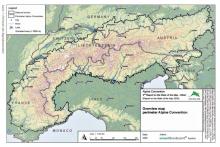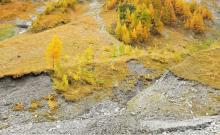Here you can find informations about the topic of alps
ALPINE CONVENTION
The Alpine Convention is a pioneer
In the 1990s, it was the world's first international agreement to consider a transnational mountain region in its entirety. The Convention signed by the eight Alpine countries Austria, Germany, Italy, France, Switzerland, Liechtenstein, Slovenia and Monaco as well as by the European Union. The Alpine Convention has been in force since 1995.
Common territory and common goals
The contracting parties share a common territory, face common challenges and have common goals: the protection and sustainable development of the Alps.
The Alps are a natural, cultural, living and economic space for more than 14 million inhabitants. Every year, many tourists spend their holidays in this mountainous area in the heart of Europe.
History of the Alpine Convention
The elaboration of an Alpine Convention already identified as one of the main objectives of the International Alpine Protection Commission CIPRA in 1952. At CIPRA's suggestion, a unanimous plenary resolution passed in the European Parliament on 17th May 1988 to draw up a "Convention on the Protection of the Alpine Region". An 89-point resolution of the environment ministers at the first Alpine Conference in Berchtesgaden in 1989 led to the concrete commitment to formulate a treaty binding under international law between the eight Alpine states and the EEC.
The Alpine Convention signed in Salzburg on 7th November 1991 by Austria, France, Germany, Italy, Liechtenstein, Switzerland and the EEC. Slovenia signed the Convention in 1993 and Monaco became on the basis of a separate additional protocol a contracting party in 1994. The Convention entered into force in 1995. Further specific obligations laid down in eight thematic protocols.
The Alpine Convention is a unique, legally binding sustainability instrument that aims to preserve the sensitive alpine ecosystems together with regional cultural identities, heritage and traditions in the Alps for future generations. The Alpine Convention is also a political arena where the Contracting Parties, in cooperation with many observer organisations, have built up great expertise over many years.
Protocols of the Alpine Convention
The protocols of the Alpine Convention contain specific measures to implement the principles laid down in the framework Convention.
The protocols regulate concrete steps for the protection and sustainable development of the Alps.
The existing Protocols cover many different issues:
- Spatial planning and sustainable development*
- Mountain farming*
- Nature protection and landscape conservation*
- Mountain forests*
- Tourism*
- Energy*
- Soil conservation*
- Transport*
Furthermore, two additional protocols have been adopted, respectively on Solution of litigations and on the Adherence of the Principality of Monaco to the Alpine Convention*.
In addition ot the protocols, the Alpine Conference has adopted the following Ministerial declarations on specific topics:
(XIV Alpine Conference, 2016)
(XV Alpine Conference, 2019)
(XVI Alpine Conference, 2020)
(XVI Alpine Conference, 2020)
* un-official English translations provided by the Permanent Secretariat of the Alpine Convention
Protocol on Soil Protection
Healthy soils are key to mitigating and adapting to climate change, preserving biodiversity and ensuring food security.
However, we lose large amounts of healthy soils every day. This loss largely caused by human soil consumption. This is particularly critical in the Alps, where soil availability is severely limited.
The Contracting Parties to the Alpine Convention have therefore committed themselves to "reducing quantitative and qualitative soil degradation, in particular through the application of soil-conserving agricultural and forestry production methods, the economical use of land and soil, the control of erosion and the limitation of soil sealing" (Framework Convention, Article 2, paragraph 2d).
Link Soil Conservation Protocol
Currently, the XV Alpine Conference has welcomed the Declaration "Sustainable Land Use and Soil Protection - Joining Forces for Nature, People and the Economy", which was prepared by Action Group 6 of the EU Alpine Space Strategy EUSALP. This Action Group is led by the Permanent Secretariat of the Alpine Convention and the Province of Carinthia.
Soil Protection Working Group
The XV Alpine Conference noted that an enhanced cooperation of the Parties in the field of soil protection is required due to the increased pressure on the use of soils in the Alpine region and the increased risk, e.g. by climate change. Thus, the Soil Protection Working Group was established in 2019.
The Working Group contributes to the protection and improvement of the condition of Alpine soils, with special emphasis on climate protection and adaptation to climate change. In doing so, the Working Group is oriented towards site-appropriate and sustainable soil management, economical use of soil and avoidance of soil degradation or soil pollution.
Building on the results of the first work phase until the end of 2020, the long-term activities regarding harmonised databases and permanent monitoring areas are continued and specified, exchange with relevant networks and awareness raising on soil protection are intensified.
Furthermore, a long-term action plan for the implementation of provisions and declarations on soil protection in the specific context of the Alpine region will be developed.
Link Soil Protectin Working Group
Link Activity Report 2019/2020
Link Mandate Proposal 2021-2022 Soil Protection Working Group
07.10.2025
CatchHedge - Potenziale von Hecken im Zeichen des Klimawandels
more ...16.+17.09.2025
32nd Conference of the Danube Region
more ...12.09.2025
Grundlagen der professionellen Bio-Mandel-Produktion
more ...10.09.2025
Agroforst u. Marktgärtnerei, Symbiose
more ...25.06.2025
Feldtag - StripTill im Bio-Mais im Trockengebiet
more ...25.06.2025
Seminar: Wildbienen- und Nützlingsförderung im Biolandbau
more ...24.06.2025
Die Maulbeere - Kultur, Produktion u.Verwendung
more ...17.06.2025
Frühjahrstagung Österr. Gesellschaft für Agrar- und Umweltrecht (ÖGAUR)
more ...13.06.2025
Seminar: Artenvielfalt in Ackerbauregionen fördern
more ...03.06.2025
Seminar: Keine Angst vor der Ackerdistel
more ...03.06.2025
Agroforstsysteme: Anbau-Modelle der Zukunft
more ...20.05.2025
IDM-Generalversammlung 2025
more ...15.05.2025
Seminar: Unkräuter/Beikräuter erkennen und als Zeigerpflanzen nutzen
more ...13.+14.05.2025
Bodenforum Österreich - Frühjahrstreffen
more ...04.05.2025
Tageskurs: Perma-Veggies - Mehrjähriges Gemüse und essbare Stauden
more ...03.05.2025
Waldgärten-Exkursion
more ...08.04.2025
Agroforst: Traditionelle Systeme von Land- und Forstnutzung verbinden
more ...26.+27.03.2025
Tagung "Weniger Bodenversiegelung, mehr Zukunft - wie gelingt das?"
more ...20.+21.03.2025
Vitiforst - wie integriere ich Gehölze in meinen Weingarten?
more ...06.+07.03.2025
Bionet Gemüsetagung 2025
more ...





